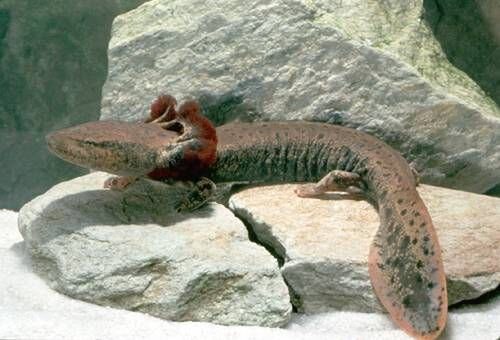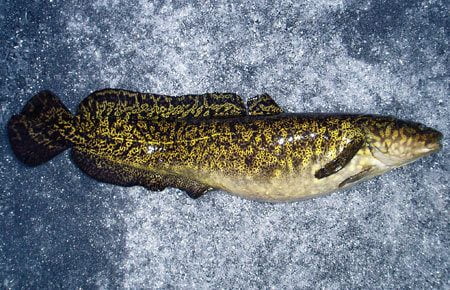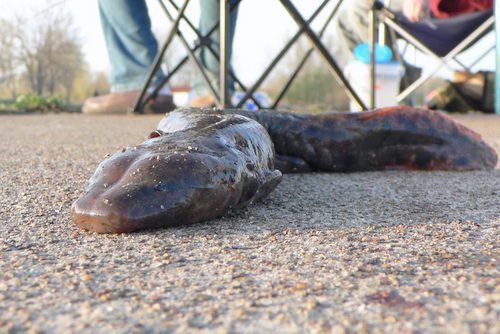Photo by Joel Sartore
Mudpuppies are one of the least understood creatures that swim in our waters and are often talked about more in the vein of a UFO encounter than an actual catch. Since most anglers don’t know what these creatures are, they are often the subject of debate, excitement, and sometimes terror when they are reeled up by an unsuspecting ice fisherman.
I have heard stories from guides who claim that the yells from an ice hut are sometimes louder when a mudpuppy has made an unexpected appearance than when they have landed a real fish.
My dad and his friends certainly fell under this category when they would take their annual ice fishing trip to Lake Nipissing where he and his buddies would fish for Walleye, consume beverages, and compete against each other to see who could catch the most fish over the weekend. Just as likely as a noise complaint from neighbouring cottages was a heated argument on whether mudpuppies counted towards the fish totals, whether it should be thrown back in the water, and what the creature they had just caught even was.
So with all this excitement and confusion surrounding this strange and unique creature, I figured I would clear up some of the most common misconceptions thrown around ice shacks and online forums about the notorious Mudpuppy.
Myth 1: “Mudpuppies are fish”
The Verdict: False
Mudpuppies are not legged fish, but rather a unique kind of fully aquatic Salamander. More than just a case of misnaming, I have heard from multiple anglers and forum contributors who were adamant that a Mudpuppy is simply a juvenile form of the Burbot, shedding its legs with age and eventually becoming the strange-looking eel-like fish we see in many of our northern lakes. While this would be an interesting transformation, the Burbot has much more in common with the saltwater Cod than any amphibian, despite their shared verticle tail.

Mudpuppy

Burbot
Myth 2: “Mudpuppies eat fish eggs and are bad for fisheries”

The Verdict: False
Although their alien-like appearance may suggest that these creatures are dangerously invasive, they are actually a valuable part of the ecosystem and act as an excellent indicator species.
The word indicator is often used to describe species that are capable of telling us about the health of an ecosystem. In the case of the Mudpuppy, the species’ low tolerance to pollutants make them a great early warning system for rising levels of toxins in the water.
This was most notably highlighted in the St.Lawrence River where high levels of pesticides and PCBs were detected in their eggs and through deformities in their bodies. The signs that these pollutants were present were found in Mudpuppies well before they reached levels high enough to harm any other species, allowing government organizations to quickly take action.
In terms of concerns over the mudpuppy’s eating habits, fish eggs make up just a fraction of their diet and has little to no effect on the overall fish population. The majority of the amphibian’s diet instead consists of crayfish and small baitfish – cravings that frequently have it crossing paths with anglers during ice season.
Myth 3: “Mudpuppies are poisonous”
 Photo by Shedd Aquarium
Photo by Shedd Aquarium
The Verdict: False
Mudpuppies are not poisonous, though their flared red gills and slimy bodies do warrant the assumption.
Though they likely won’t harm you, their strange smelling slime and tendency to thrash around when hooked will surely leave an unpleasant coating on your hands, line, and virtually everything else it touches.
Myth 4: “Mudpuppies are blind”
 Photo by Jeff Hankey
Photo by Jeff Hankey
The Verdict: False
This is one that I have never heard in person but seemed to run into quite a bit on forums. The origins of this myth are still unclear to me, however, mudpuppies are not blind and actually have excellent eyesight, doing almost all of their hunting at night or when the water is especially murky.
Myth 5: “Mudpuppies can survive being frozen”

The Verdict: False
This is perhaps the strangest thing I heard about Mudpuppies when cruising forums in search of these myths. The idea behind this one is tied to the misconception that Mudpuppies are harmful to the ecosystem and should be eradicated- except with a slightly stranger twist.
It has been rumoured that when anglers leave Mudpuppies on the ice to freeze and die, they instead enter a coma-like state and return to life in the spring when they thaw out and fall back into the water. Where this myth started I have no idea but it is safe to say that it is entirely untrue and that the Mudpuppy is in no way immune to freezing, nor should it be kept from going back in the water.
Myth 6: “Mudpuppies bark when frightened”


The Verdict: True?
The idea that Mudpuppies bark when frightened is actually the one supposedly true notion mentioned in this article and is likely the source of the amphibian’s strange name.
In fact, Fish’n Canada’s own Angelo Viola, experienced this first hand, just inches from his face.
 The 10,000-gallon aquarium in the original Barklay’s building
The 10,000-gallon aquarium in the original Barklay’s building
“One of the aquariums at our old building had all kinds of different fish in it,” said Angelo, “Bass, Carp, Perch, we had it all.”
“One day, however, we had someone bring in something that was not a fish and asked us if we would take it for the tank – two small, 12-inch Mudpuppies.”
Unfortunately, just weeks after accepting the mudpuppies, both creatures mysteriously went missing and another aquarium experiment was chalked up to the overly hungry bass that also occupied the tank.
Over 5 years after the mudpuppies disappearance, Angelo noticed that the skimmer was not working quite right and went up to investigate. Squeezing into the small maintenance area behind the tank, Angelo set up his ladder and began ascending the steps to where the water was supposed to be flowing in.
Just as he reached the skimmer and began to peer under the inflow, a massive Mudpuppy darted through the darkness and stopped with, a loud hiss, right in front of his face.
“It almost knocked me off my ladder,” said Angelo. “I mean, this thing had to be close to 2 feet long!”
How a Mudpuppy of this size stayed hidden for over 5 years is still a bit of a mystery, but their preference for small dark spaces and nocturnal tendencies certainly made it a good candidate for surviving the 5-year campout behind the Fish’n Canada fish tank.
https://fishncanada.com/mudpuppy-ice-fishings-most-confusing-by-catch/
 CampingSurvivalistHuntingFishingExploringHikingPrivacy PolicyTerms And Conditions
CampingSurvivalistHuntingFishingExploringHikingPrivacy PolicyTerms And Conditions
